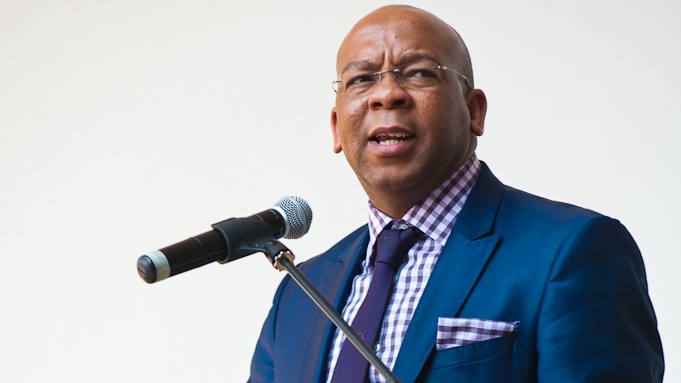- After starting late, Cyril Ramaphosa announced a batch of new ministers on Monday evening.
- This includes the Minister of Electricity, Kgosientsho Ramokgopa.
- The former Mayor of the City of Tshwane has the unenviable task of addressing the energy crisis.
On Monday evening, after a very delayed start, President Cyril Ramaphosa revealed the changes to the executive council including the Minister of Electricity. The contentious position was revealed as part of government’s plan to address loadshedding during the State of the Nation Address last month.
“The primary task of the new Minister will be to significantly reduce the severity and frequency of load shedding as a matter of urgency,” Ramaphosa said in the midst of Stage 5 loadshedding.
“To effectively oversee the electricity crisis response, the appointed Minister will have political responsibility, authority and control over all critical aspects of the Energy Action Plan. This will help to deal with the challenge of fragmentation of responsibility across various departments and Ministers which, while appropriate under normal circumstances, is not conducive to a crisis response,” the president added.
The person burdened with the weight of addressing the energy crisis will be Dr Kgosientsho Ramokgopa.
“I am humbled by the vote of confidence given to me by His Excellency President Cyril Ramaphosa as Minister of Electricity. We have a mammoth task ahead of us to resolve the energy crisis that confronts our country,” the newly minted minister said in a tweet.
“In the immediate, we have a primary responsibility to turn around the performance of existing power stations and stabilize our energy supply, whilst adding new capacity to the grid,” Ramokgopa added.
The new minister has a doctorate in Pubic Affairs from the University of Pretoria as well as a Master’s degree in Public Administration from the same institution. In addition, Ramokgopa has a Master’s in Business Leadership from UNISA as well as a Bachelor of Science in Civil Engineering from the University of Durban Westville.
Before Monday evening, Ramokgopa was Head of the Investment and Infrastructure office in the office of the President of South Africa. Prior to tha appointment he was Gauteng MEC for Economic Development, Agriculture and Environment.
“Previously, I held the position of Executive Mayor of the City of Tshwane between 2010 and 2016, at the time I was one of the youngest Mayors of a Metropolitan in the country. My previous positions include holding the position of CEO for both the Metropolitan Trading Company and the Johannesburg Market. Previously I was the Deputy Chairperson of the board of Trade and Investment in Limpopo,” the minister writes on his LinkedIn profile.
A new cabinet, sort of
While there are a number of new faces in the National Executive, there are also a number of stalwarts who remain unmoved. These include:
- Minister of Basic Education – Angie Motshekga,
- Minister of Higher Education, Science and Innovation – Blade Nzimande,
- Minister of Labour – Thulas Nxesi,
- Minister of Trade and Industry – Ebrahim Patel,
- Minister of Finance – Enoch Godongwana,
- Minister of Mineral Resources and Energy – Gwede Mantashe,
- Minister of Public Enterprise – Pravin Gordhan,
- Minister of Police – Bheki Cele.
As for the reshuffle, there is a new Minister of Communications and Digital Technologies, as well as a reassignment for Dr Nkosazana Dlamini Zuma.
The new cabinet includes:
- Minister in the Presidency – Khumbudzo Ntshavheni,
- Minister in the Presidency responsible for Women, Youth and Persons with Disabilities – Dr Nkosazana Dlamini Zuma,
- Minister in the Presidency responsible for Planning, Monitoring and Evaluation – Maropene Ramokgopa,
- Minister in the Presidency responsible for Electricity – Dr Kgosientsho Ramokgopa,
- Minister of Communications and Digital Technologies – Mondli Gungubele,
- Minister of Cooperative Governance and Traditional Affairs – Thembi Nkadimeng,
- Minister of Public Service and Administration – Noxolo Kiviet,
- Minister of Public Works and Infrastructure – Sihle Zikalal,
- Minister of Sports, Arts and Culture – Zizi Kodwa,
- Minister of Tourism – Patricia de Lille,
- Minister of Transport – Sindisiwe Chikunga.
Furthermore, Ramaphosa also appointed a number of new deputy ministers including:
- Deputy Ministers in the Presidency – Nomasonto Motaung and Kenneth Morolong,
- Deputy Minister in the Presidency responsible for Women, Youth and Persons with Disabilities – Sisisi Tolashe,
- Deputy Minister in the Presidency responsible for Planning, Monitoring and Evaluation – Pinky Kekana,
- Deputy Ministers for Cooperative Governance and Traditional Affairs – Parks Tau and Zolile Burns-Ncamashe,
- Deputy Ministers for Water and Sanitation – David Mahlobo and Judith Tshabalala,
- Deputy Minister of Public Works – Bernice Swarts,
- Deputy Minister of Small Business Development, – Dipuo Peters,
- Deputy Minister of Public Enterprises – Obed Bapela,
- Deputy Minister of Transport – Lisa Mangcu.
The President acknowledges that this new cabinet will result in an increase in the number if ministries. However, he adds that this is not meant to be permanent and that he has “instructed the Presidency and National Treasury to develop a proposal to rationalise government departments, entities and programmes to ensure greater efficiency.”
“This work, which will result in the reduction of the number of Ministries, will inform the configuration of government going into the next administration,” Ramaphosa added.
Whether this will indeed be the case or whether government will remain bloated in 2024 going into the General Election, remains to be seen.
[Image – CC BY 2.0 mLab Southern Africa]

